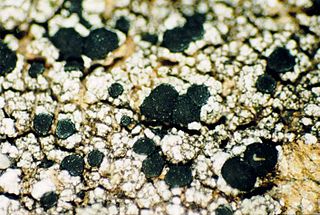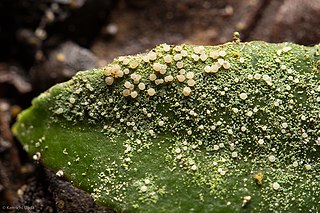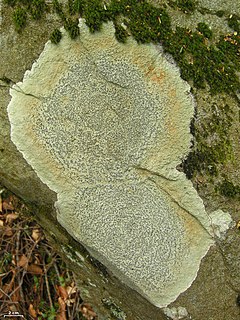
The Lecanoraceae are a family of lichenized fungi in the order Lecanorales. Species of this family have a widespread distribution.

Bacidina is a genus of lichens in the family Ramalinaceae. It was circumscribed by Czech lichenologist Antonín Vězda in 1990, with Bacidina phacodes assigned as the type species. Vězda included 11 species in Bacidina, which was originally classified in the Lecideaceae. These species had previously been placed in genus Bacidia.

Trapelia is a genus of lichenized fungi in the family Trapeliaceae.

Lecania is a genus of lichenized fungi in the family Ramalinaceae. The genus was circumscribed by Abramo Bartolommeo Massalongo in 1853. Lecania is widely distributed, especially in temperate regions, and contains about 64 species.

Fellhanera is a genus of mostly leaf-dwelling lichens in the family Pilocarpaceae. The genus, circumscribed by lichenologist Antonín Vězda in 1986, honours Austrian lichenologist Josef Hafellner.

Amandinea is a genus of lichenized fungi in the family Caliciaceae. Genetic studies indicates that the genus Amandinea and Buellia are the same, although this is not widely accepted.
Agonimia is a genus of lichen-forming fungi in the family Verrucariaceae.

Psoroglaena is a genus of lichen-forming fungi in the family Verrucariaceae.

Lecidella is a genus of crustose lichens in the family Lecanoraceae.

Miriquidica is a genus of lichen in the family Lecanoraceae. The genus was circumscribed in 19876 by lichenologists Hannes Hertel and Gerhard Rambold, with Miriquidica complanata assigned as the type species. According to Dictionary of the Fungi, the widespread genus contains 23 species, found predominantly in arctic-alpine regions.

Thelopsis is a genus of lichenized fungi in the family Stictidaceae. It was circumscribed by Finnish lichenologist William Nylander in 1855, with Thelopsis rubella as the type species.

Porpidia is a genus of crustose lichens in the family Lecideaceae.

Fuscidea is a genus of crustose lichens in the family Fuscideaceae. It has about 40 species. The genus was circumscribed in 1972 by lichenologists Volkmar Wirth and Antonín Vězda, with Fuscidea aggregatilis assigned as the type species.

Protoparmelia is a genus of lichenized fungi in the family Parmeliaceae. The genus has a widespread distribution, and contains 11 species. Protoparmelia was circumscribed by French lichenologist Maurice Choisy in 1929.

Dibaeis is a genus of lichen-forming fungi in the family Icmadophilaceae. The genus is widely distributed in tropical regions. Dibaeis was circumscribed in 1909 by Frederic Edward Clements with Dibaeis rosea as the type species. Several species were transferred from other genera in a 1993 publication.

Halecania is a genus of fungi in the family Leprocaulaceae. It has 22 species. The genus was circumscribed by Austrian lichenologist Michaela Mayrhofer in 1987, with Halecania alpivaga assigned as the type species. She created Halecania to contain species, formerly placed in Lecania, with the following characteristics: uniformly amyloid apical domes, paraphyses with dark brown apical caps, and halonate ascospores.














